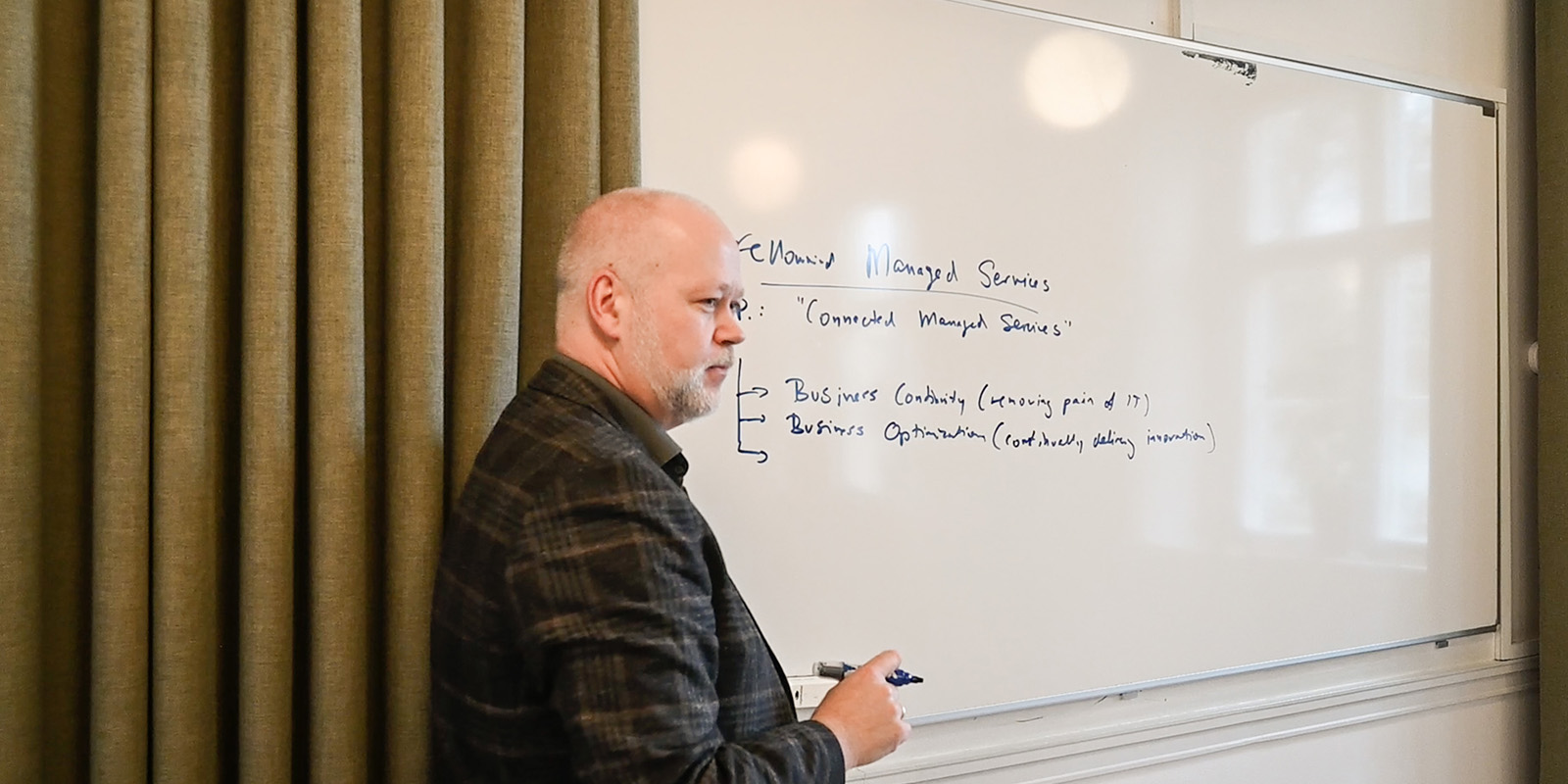Managed Services: How a new customer mindset is transforming IT delivery
IT has evolved to a service businesses expect to run uninterrupted. Our Executive Director, Gorm, takes us through the journey from installation to managed services.

Gorm Priem leads Fellowmind's fast-developing Managed Services business. He explains how a shift in customer expectations has opened the door to a fresh wave of innovation in the field.
The concept of outsourcing IT management to a third party has been around since the 1990s. But now, this Managed Services approach is being reshaped by some new drivers – what can you tell us about those?
- The underlying driver is a change in the customer's mindset. Over the past 10 years, we've seen a wave of cloud technology as an enabler of IT services. This move to the cloud has changed the customer's view on how services should be delivered, Gorm tells us.
In the old days, IT was something you purchased, installed, and configured in a set project. Then, the technology would need to be upgraded or renewed at some point. Eventually, it would be too old and had to be replaced entirely. In this way, IT providers moved from one project to the next.
Now, customers expect IT to be delivered like electricity. You have a subscription, and the service should always be available and working perfectly. This mindset change among customers means IT providers must consider ongoing service delivery.
How has this shift impacted the way Fellowmind works with its customers?
In the past, Fellowmind would perform a project and then attach a Managed Services agreement on top. The main business is the managed service, with the project as an enabler to onboard the customer. We've turned the approach upside down. Instead of starting the customer dialogue from a project-based approach, we look at what kind of service is expected over the long run.
We also used to think that if you needed to do something innovative – such as introduce a new service or way of working – then you did that as part of the project. But what the customer now wants is for the project to be done as fast and cost-effectively as possible, with innovation as something you do together in an ongoing way.
What changes have you seen in the technology being implemented, maintained, and developed through Managed Services along with this mindset shift?
The first wave of cloud transformation was simply about getting your IT delivered more efficiently. Then came a wave of interest in security. If you talked about moving to the cloud five or 10 years ago, people would voice concerns about how secure it may be.
Now customers realize that with security challenges being so great, the best option is simply to pass that responsibility to a partner who really knows what they're doing. When a customer today thinks about becoming more secure, they look for a good service – they do not think about doing it alone.
We provide services for business optimization. It is about continuously leveraging new innovations to create value for the customer. Fellowmind advises the customer on the direction to take, and we create new features accordingly.
The third wave of transformation is around Artificial Intelligence. No customer who wants all the benefits of AI seriously thinks they need to develop their own AI capability and have it running somewhere in a basement. You need to onboard and leverage an AI service that's developed and supplied by a partner who is up to the job.
Now, we see a surge of interest in AI among our customers who use Microsoft for their ERP or CRM systems. These customers expect that AI will come as part of the package – they do not want to buy a new platform or do a new project to enable AI.
Can you give us an idea of the Fellowmind Managed Services offering? How does the company set itself apart from other IT vendors?
We've structured our offering into three standardized service tiers: basic, premium, and enterprise. Our value proposition also covers three areas.
On one hand, we provide IT support for business continuity. These services keep your company running smoothly. If something breaks, it gets fixed immediately, so business-as-usual operations can continue.
On the other hand, we provide services for business optimization. This is about continuously leveraging new innovations to create value for the customer. Fellowmind advises the customer on the direction to take, and we create new features accordingly.
The third component of our Managed Services proposition is success management. Here, we essentially combine our business continuity and business optimization services with the customer at the center. IT companies often seem to provide one service approach or the other, but Fellowmind has successfully combined both, which also gives us a competitive edge.
How is Fellowmind's shift to Managed Services driving the company's growth and transformation? What actions are you taking?
When Fellowmind started offering Managed Services in a structured way about two years ago, the business accounted for some 11% of our revenue. Today, this share is going beyond 20%.
Of our 2000 employees across Europe, some 400 are now dedicated to Managed Services. When a customer engages with Fellowmind, it's through a local team in their own language. This is an essential part of our engagement model with the customer. Our local team knows all the business applications from the customer's point of view.
If difficult tasks or critical breakdowns arise that require outside expertise, then Fellowmind orchestrates the solution and brings in the right person. We coordinate these special tasks through the 24/7 operations center we recently opened in Denmark. We have eight employees there working in shifts.
For as long as I've been in this industry, IT providers have talked about wanting to be strategic partners to their customers. Taking on Managed Services responsibility in a structured way truly enables the continuous support and innovation that define such strategic partnerships.


